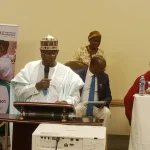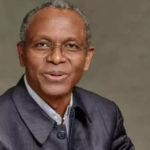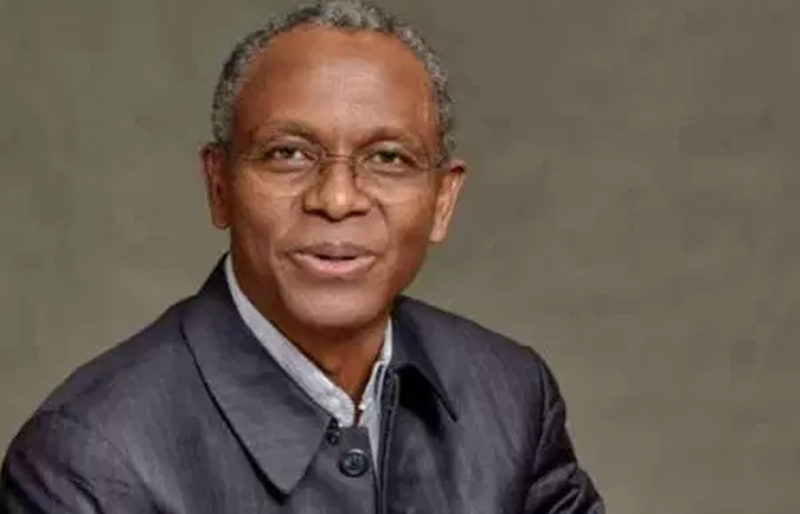Nigeria is strategically placed to drive a new phase of intra-African trade and investment, Vice President Kashim Shettima said on Friday, highlighting the country’s market size, innovation capacity, and economic strength as critical assets for continental growth.
Shettima’s remarks were delivered by his Deputy Chief of Staff, Alhaji Ibrahim Hassan Hadejia, during a High-Level Conference on Intra-African Trade convened by Woodhall Capital at the Presidential Villa in Abuja.
The event precedes a series of investor roadshows scheduled for London, Dubai, and Abu Dhabi.
The gathering brought together key stakeholders, including governors, investors, diplomatic representatives, and heads of ministries and development finance institutions.
In his address, the Vice President commended Woodhall Capital for what he described as an “audacious and patriotic initiative” aimed at securing international funding for both national and subnational entities. He praised the effort as a blueprint for converting potential into actionable investment opportunities.
“For too long, the narrative of African trade has been dictated by what we extract and export to the Global North,” Shettima said. “Today, we must pivot and activate the vast untapped energy of intra-African trade. While trade within the EU and Asia stands at 65 and 60 percent respectively, Africa’s intra-continental trade remains below 17 percent. That must change.”
He emphasized that the shift in trade dynamics would not be driven solely by the federal government in Abuja but also by subnational governments that can present viable, de-risked, and market-aligned projects to international investors.
“Governors must take the lead in driving this transformation. As a government, we recognise that to attract sustainable investment, we must build an environment anchored on predictable policy, institutional transparency and accountability,” he added.
Reaffirming the Tinubu administration’s economic reform agenda, Shettima said efforts to stabilise the naira, eliminate subsidies, improve trade integration, and enhance the business environment through the Presidential Enabling Business Environment Council (PEBEC) remain on course.
“Capital follows confidence, and confidence follows governance,” he declared. “The capital is ready, the markets are ready, and the world is watching. This is Nigeria’s moment to redefine its place in Africa’s economic story — not as a participant, but as a leader.”
In a show of support from the subnational level, Nigeria Governors’ Forum (NGF) Chairman and Kwara State Governor, AbdulRahman AbdulRazaq, reiterated the commitment of state governments to foster investor-friendly environments. Represented by Zamfara State Governor Dauda Lawal, AbdulRazaq underscored the role of subnational entities in unlocking Africa’s next phase of trade and industrial development.
He referenced the NGF’s collaboration with Woodhall Capital and Afreximbank as a major milestone in connecting state-led project pipelines to credible global investors. According to him, the forthcoming investor roadshows will highlight opportunities across sectors such as energy, agriculture, logistics, infrastructure, and the creative economy.
“This meeting is not just a prelude to our international mission,” he said. “It is a declaration that Nigerian states are open for business, already bankable and globally competitive.”
Representing Afreximbank President Prof. Benedict Oramah, Mr. Alain-Thierry Mbongue, Acting Regional COO and Head of Mission for Anglophone West Africa, reaffirmed the bank’s dedication to empowering subnational governments across the continent. He described the conference as “a pivotal juncture in Nigeria’s investment narrative,” pointing to the African Sub-Sovereign Government Network (AfSNET) as a platform for regional leaders to access custom financing and share best practices.
“Our philosophy is simple — development must be decentralised,” he said. “It must begin where needs are most keenly felt, in cities, provinces and regions, and radiate outward to influence national and continental progress.”
Mbongue also revealed that Cross River State will host the next AfSNET Investment Forum in 2026.
Also speaking at the event, President of Woodhall Capital, Mrs. Mojisola Hunponu-Wusu, urged investors to tap into Nigeria’s evolving economic landscape. She described the conference as “a convergence of purpose, partnership and vision,” lauding President Bola Tinubu’s reforms—such as forex liberalisation, exchange rate unification, and capital market restructuring—for restoring investor confidence and positioning Nigeria as a competitive investment hub.
“This forum is not merely a conversation; it is a bridge connecting policy with capital, Nigeria with the world, and vision with measurable impact,” she said. “No longer do we go with begging bowls to international countries. We believe there’s investment onshore, on the continent.”
Hunponu-Wusu announced that the NGF–Woodhall Capital investor roadshows in London, Dubai and Abu Dhabi will serve as platforms for states to directly engage with financiers and strategic partners. She also acknowledged Afreximbank’s role as a consistent supporter, calling it “a big brother to Woodhall Capital,” and paid tribute to its outgoing President, Prof. Oramah, while expressing confidence in incoming President Dr. George Elombi.
As Nigeria positions itself at the forefront of a continental trade revolution, speakers at the forum agreed that collaboration between reform-driven political leadership, financial innovation, and disciplined capital deployment will be crucial in reshaping Africa’s economic landscape.











